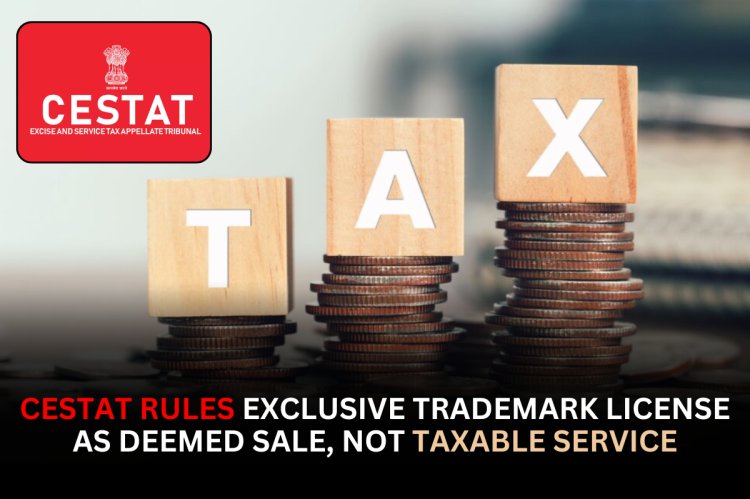CESTAT Rules Exclusive Trademark License as Deemed Sale, Not Taxable Service
The Delhi CESTAT has ruled that an exclusive, long-term trademark license granted by Bajaj Resources qualifies as a "deemed sale" under Article 366(29A), not a taxable service. This landmark decision clarifies service tax applicability in IP licensing and sets a precedent for future cases.

Introduction
In the complex world of indirect taxation and intellectual property licensing, the lines between "service" and "sale" often blur—especially when it comes to royalty arrangements. A recent decision by the Delhi Bench of the CESTAT brings much-needed clarity to this grey area. At the heart of the dispute was a long-term, exclusive trademark license granted by M/s. Bajaj Resources Limited to its subsidiary. The central question: Should such royalty payments be taxed as a service or treated as a sale?
The Tribunal's answer marks a significant shift in how exclusive IP licenses are viewed under the service tax framework. By classifying the transaction as a "deemed sale" rather than a taxable service, the ruling not only provides relief to the appellant but also sets a precedent with wide-ranging implications for similar licensing arrangements across industries.
Background of the Dispute
For the use of specific trademarks, the appellant, M/s. Bajaj Resources Limited, had a licensing agreement with M/s. Bajaj Corp Limited (BCL), a fully owned subsidiary of M/s. BCCL. Through a Trademark License Agreement dated 12.03.2008, the trademark was first granted a 10-year, non-exclusive license in the Andhra Pradesh territory. Over time, the terms expanded significantly—first extending the length to 25 years and expanding the territorial rights to Rajasthan, and eventually, through a novation agreement, transforming the license into an exclusive, worldwide right valid for 99 years.
Royalties collected under the original agreements were taxed in accordance with M/s. Bajaj Resources Limited's service tax registration under the "Intellectual Property Services" category. However, the appellant contended that the arrangement now constituted a "deemed sale," falling under the jurisdiction of Article 366(29A) of the Indian Constitution, subsequent to the novation of the agreement and the exclusivity granted to BCL as a result. According to Section 65B (44) of the Finance Act of 1994, these sales are not considered "service."
To know more about this you can follow the link below:
The Refund Claim and Revenue's Response
M/s. Bajaj Resources submitted a refund claim for ₹79,52,935 on 05.12.2014, based on the updated legal situation, for service tax paid in FY 2013–14. The claim was denied by the Department, which maintained that the agreement dated February 24, 2010, did not transfer the legal right of trademark ownership or possession and simply permitted usage rights. Since the royalty was received in exchange for a service rather than a sale, they categorised the transaction as a taxable intellectual property service.
Furthermore, in accordance with audit results, a show-cause notice was sent for failure to pay service tax on ₹761.36 lakhs in royalties received in FY 2014–15. The Department said that in addition to interest and penalties, service tax was due and should have been paid. Additionally, the Commissioner (Appeals) backed the tax demand and maintained the refund's denial.
CESTAT’s Key Observations and Verdict
A permanent transfer of an intellectual property right, in which the transferor gives up all rights, is not a service, the Tribunal stressed. The novation agreement expressly gave BCL exclusive rights, to the exclusion of the transferor, meeting the requirements for a presumed sale even if the prior agreements were non-exclusive. Despite the license's set duration of 99 years, BCL essentially owned all rights normally associated with ownership during that time due to the arrangement's exclusive nature.
CESTAT clarified that the transfer of the right to use products or intellectual property (IPR) alone qualifies as a presumed sale under the constitutional requirement of Article 366(29A). This is particularly excluded from the scope of taxable services under the modified service tax regime, which goes into effect on July 1, 2012.
Final Outcome: The appeal was granted by CESTAT, which also rejected the reimbursement and overturned the orders for service tax. According to the Tribunal, royalties paid under a novated agreement are exempt from service tax as it resulted in a presumed sale.
Conclusion
In the field of intellectual property taxation, the CESTAT's decision in the M/s. Bajaj Resources Limited case establishes a significant legal precedent. The Tribunal has established a clear distinction between what constitutes a taxable service and what is not by confirming that the granting of an exclusive licence, in which the transferor gives up all rights to use the trademark for the term of the agreement, constitutes a "deemed sale" under Article 366(29A) of the Constitution.
For businesses creating long-term IP licensing contracts, this choice is very important, especially in industries where brand and trademark licensing is a key source of income. In addition to providing much-needed clarification to a previously unclear tax situation, it shields these organisations from excessive tax obligations under the since-repealed service tax system.
In a broader sense, the decision upholds the legislative and constitutional aim that an exclusive transfer of usage rights, even if it is only temporary, should be regarded as a sale, so long as the transferor is totally barred from using those rights for the duration of the agreement. The larger body of legal precedent on presumed sales and their exemption from service tax is consistent with this understanding.
In light of this development, companies, tax experts, and legal counsel should review their intellectual property agreements, especially those pertaining to exclusive rights, to make sure they are appropriately categorised for taxation. If this isn't done, there may be needless legal action, financial consequences, and compliance issues. This ruling essentially fortifies the legal differentiation between property transfer and service provision in IP law, opening the door for future licensing scenarios to apply tax laws more consistently.
AUTHOR- BHAVPREET SINGH SONI
CO AUTHOR– HRITIKA MALHOTRA












